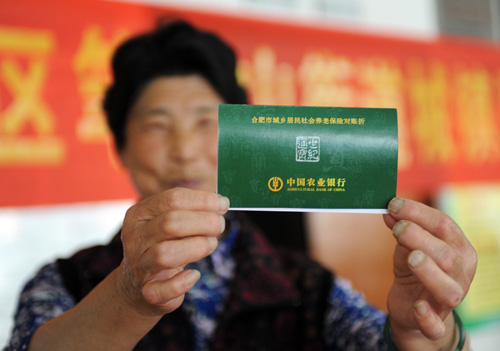|
 |
|
HOLDING TIGHT: A resident in Hefei, capital of Anhui Province, shows off her pension record book (DU YU) |
Seeking a way out
The enormous shortfall in China's pension fund system has led to calls for reform. Suggestions include filling the gap with profits of state-owned enterprises (SOEs), more input from government revenue, managing the pension fund at a state-level government department, and postponing the retirement age.
China should appropriate more assets from SOEs to expanding the social security fund, which along with pension funds includes money allocated for healthcare insurance, said Dai Xianglong, Chairman of the National Council for Social Security Fund, at a press conference releasing the China Pension Report 2012 on December 17.
For the past 10 years, the Central Government has emphasized subsidizing the social security fund with state assets. "It's time to make a decision and put words into action," said Dai.
Specifically, Dai believes the gap should be covered by the profits generated by SOEs.
By the end of 2011, the net assets of SOEs had totaled 15 trillion yuan ($2.4 trillion). He argues for the expeditious transfer of part of those assets to cover the pension shortfall.
He suggests the country allocate 10 percent of the stakes of listed SOEs to the social security fund; second, no less than 20 percent of the profits of SOEs should be earmarked to the social security fund; finally, if the country holds too high a proportion of the stake in an SOE, then part of the stake should be transferred to the social security fund, said Dai at the press conference.
Another suggestion is the more input from fiscal revenue.
"Why was money diverted from individual accounts to deliver pensions for retirees? The 2.2-trillion-yuan shortfall is caused by the fact that pension payers are supporting pension drawers, which is a job that should have been done by the government. Therefore, government has the obligation to make up for, or return, the inverted money from the individual fund, with fiscal revenue," said Yu.
In China, social security spending only accounts for 12 percent of total spending, a lot less than the proportion in developed countries, which ranges from 30 percent to 50 percent, said Yu.
China's pension reserves account for only 2 percent of GDP, which is too low, Dai said. He compared the rate with that of Norway, which is 83 percent; Japan, which is 25 percent; and the United States, which is 15 percent.
Zheng said that pension funds should be managed by a state-level government body and integrated nationwide.
Some provinces have more income than costs and some have more costs than income. In order to solve the imbalance, China should create a unified pension scheme, according to Zheng.
He also argues that the retirement age should be pushed back.
An aging population is a challenge many countries confront. At present, people in the United States and Germany retire at 65-67 years old, but in China, men retire at 60 and women at 50 or 55.
The present retirement age was set in the 1970s. Since then, life expectancy has risen by seven years, although the retirement age remains the same.
"To ask people to retire later is more feasible than asking them to pay a higher rate of insurance or reducing their benefits," Zheng said. "Many developed economies set the retirement age at 65."
Email us at: zhouxiaoyan@bjreview.com | 